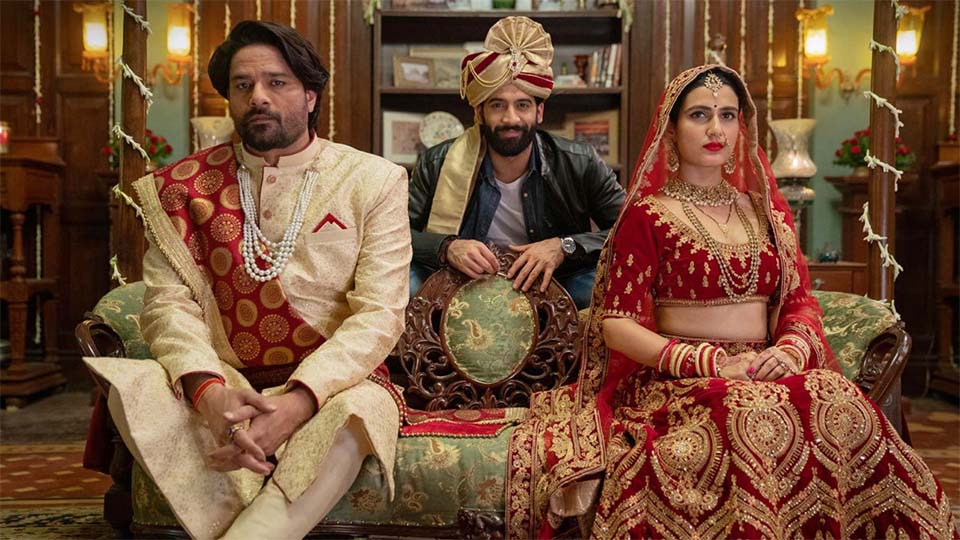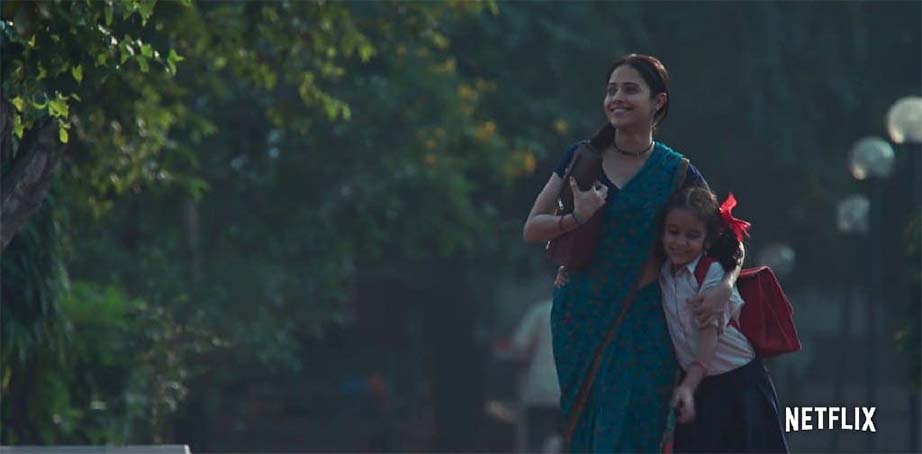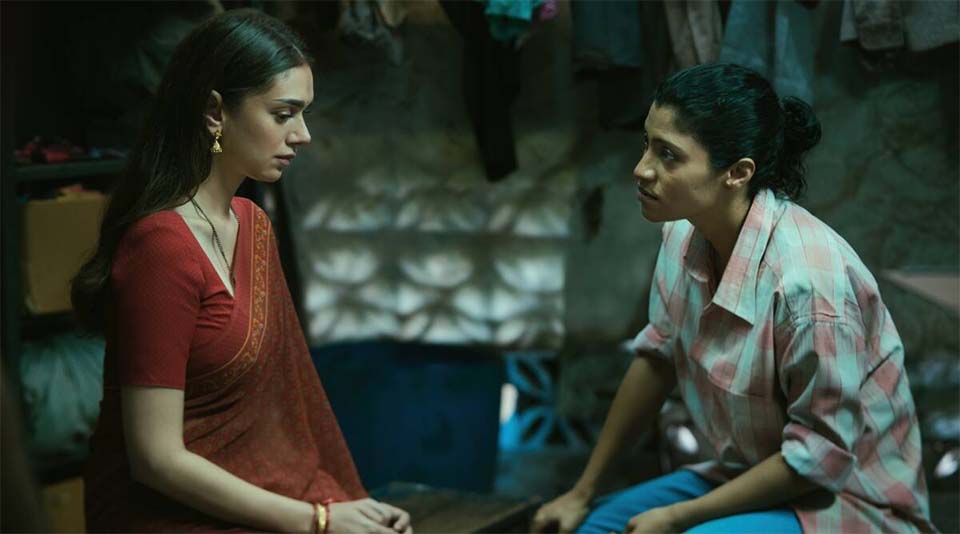“Pata hai kitaabe in filmo se acchi kyon hoti hai?
Kyuki kitaabe ko padhte waqt hum apni khud ki duniya banaate hain”
Ajeeb Daastaans, an anthology of storytelling marvel, set in four different societies, leaving the viewer in gasps and sigh simultaneously. I have attempted to open each story carefully, page by page, and making sure there are no spoilers hidden between any of the lines.
‘MAJNU’

The first story in the list, directed by Shashank Khaitan, revolves around Babloo (Jaideep Ahlawat) a local gaffer, who is hung up on an old flame but married, under political obligations, Lipakshi (Fatima Sana Shaikh), daughter of a powerful, seat grabber politician. The story begins with Babloo making it explicitly clear to his new bride, who is sitting in her lehenga, waiting for her marriage to consummate, that he has married solely for political reasons and is still in love with somebody else. Lipakshi confronts with few strong dialogues and the scene rests.
As the story unfolds itself, Lipakshi has become the local enchantress leaving Babloo disappointed by her behavior but helpless in the situation. A little while into the story, Rajkumar (Armaan Ralhan), son of Babloo’s driver, enters, as a foreign return student, awaiting to join his job in London. Lipakshi tries to make a pass on him to which he respectfully denies but as the story wheels to its end, Raj and Lipakshi begin their illicit relationship, making Lipakshi fall head over heels for him and they decide to run away the next day. Parallelly, Babloo receives a courier of photographs which leaves him infuriated, followed by a hear-to-heart conversation with Raj. The story ends with Babloo and Lipakshi holding hands, as the twisted ending had fallen on their laps.
In my personal opinion, this was my least favorite of the four short films. Jaideep Ahlawat, the brilliant actor that he is, Babloo’s back story, the truth behind his character, did not look as convincing. Although the dialogues were strong and captivating, the story wasn’t. It lacked a little continuance between scenes as well but overall, it is a good watch.
‘KHILAUNA’

The second in the list, directed by Raj Mehta, an exceedingly stellar storyline, dark but spiffing. The scene opens to a slum dwell, where you see Minal (NushratBharucha) and Binny (Inayat Verma) sleeping with their television on when their lights are cut off by 2 men, clearly following orders.
The story then skips to a police station, where an inspector is found talking to Binny, asking her about her relations with Sushil (Abhishek Banerjee). The story flows back and forth, to the past and the present, where Sushil, Minal, and Binny are seen in the police station, being inquired about a crime that occurred on the previous night. Each and every element in this story is placed minutely and timed correctly. Only if you look closely and repeat your watch, you would realize how all of it falls into one whole bowl of sensational narrative. Talking more about this story might give away some very crucial moments, so I would leave it here.
In my personal opinion, this was the best of all the four and I would highly recommend everyone to watch. The storyline is gripping, the casting is perfectly tied with their seamless performance.
Also Read: Why is laundry only a mother’s job?
‘GEELI-PUCCHI’

The third in the list, directed by Neeraj Ghaywan, is a combination of stereotypes, folded neatly in an unconservative manner, reflecting the mindset and troubles of the people on the receiving end of the stereotype. The prejudicial attitude towards the lower cast, the inner struggle with one’s sexuality, the heartbreak, and a non-murderous vengeance for it all.
The story revolves around Bharti Mandal (Konkona Sen Sharma) and Priya Sharma (Aditi Rao Hydari), their fights and friendships, an unsaid bonding, and a heartbreak coupled with retaliation. The story walks around the society’s rigorous caste system and heterosexuality, hand in hand, leaving you with no questions but only an implied understanding. The difficulties that a lower cast Bharti Mandal has to face for a job she deserves and the privileges of an upper cast Priya Sharma, in gaining the job right in her hands because of obvious reasons is what initially leaves us rethinking about our own society, it’s the birth-based caste system.
In my personal opinion, the story was amazingly cut out and expressed comfortably, untying every knot, unfolding the life of protagonists. The actors are as usual marvellous and there are lot of unspoken emotions that well up as the story rolls. I would rank third in the list of four, but only because I had a feeling that something is missing and I cannot put my finger on it.
‘ANKAHI’

The fourth in the list, directed by Kayoze Irani, running in a fairly high-end society, is about a family, where the child is about to lose her hearing abilities, which time and again gives birth to the family’s calm environment. The mother (Shefali Shah), is putting day and night together, to be with her daughter (Sara Arjun), by learning sign languages and communicating with her. She is at her wit’s end at the beginning of the story, arguing with her husband (Tota Roy Chowdhury) who seems like a distant father, not wanting to accept the sudden disability of his daughter. In-between these regular arguments, Natasha (Shefali Shah) finds a companion (Manav Kaul) who too, like her daughter, has lost his abilities to hear. The constant distance between the couple, makes Natasha feel drawn towards Kabir (Manav Kaul), developing an intimate relationship between them, which in the end, leaves one of them with a broken heart.
In my opinion, the story has beautifully depicted the contemplation of a woman, constantly torn between her duty as a mother and a wife, going nuts in making the ends meet, when in the mean time finds a distraction that helps her stay sane. Although looking at the storyline, it is a little cliche, a little obvious, predictable in many ways, but the beauty lies in the art of telling such stories, which according to me earned full marks.
All the four stories are fairly put together, not unnecessarily touching any un-needed back stories of the characters and leaving the viewer amazed by such gaping story telling abilities. The last three of the four stories have used the ‘show and tell’ principle aptly, not leaving any confusion in the minds of the viewers.
If you are a lover of the art of story-telling, this movie is for you.
The article is written by KSHITI (@kshiiti)
This article is Curated by Vaibhav. His Instagram id is @frameshade
You can follow “THE UNCOMMON BOX” at the following social channels






























Good narration… Looks you became also a good story teller